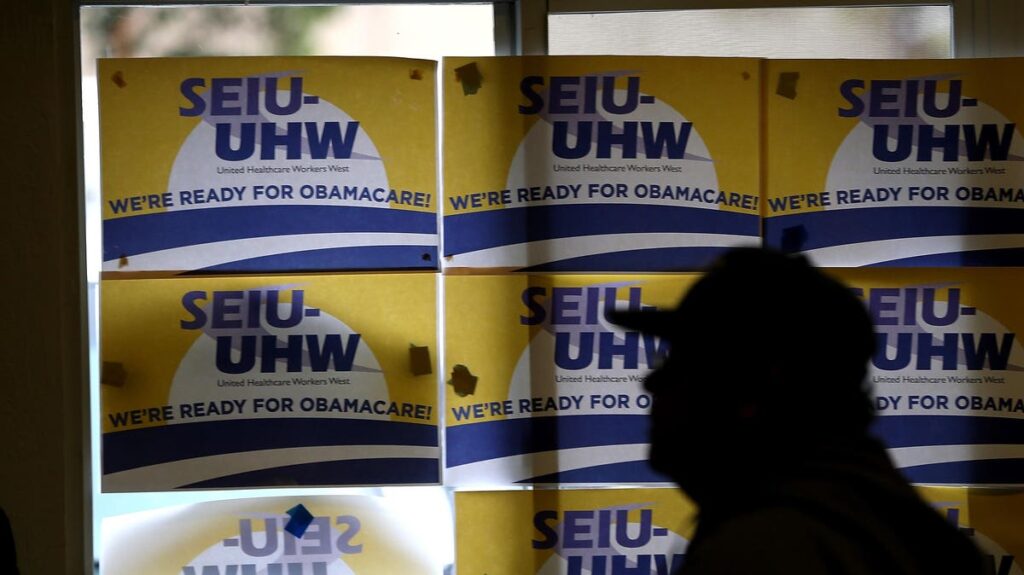Topline
Over 75,000 healthcare workers in California, Colorado, Oregon, Virginia, Washington and Washington, D.C., are expected to head to the picket lines starting Wednesday after contracts with nonprofit Kaiser Permanente—one of the nation’s largest health organizations—expired over the weekend.
Kaiser Permanente workers a part of SEIU-United Healthcare Workers West (SEIU-UHW) are prepared to … [+]
Key Facts
Kaiser Permanente workers across the country are preparing to strike as early as Wednesday morning up until Friday morning—with some already on the picket line, citing demands for increased wages and improvements to retirees’ medical plans.
Kaiser spokesperson Hilary Costa told Forbes in a statement Kaiser and union coalition representatives are still at the bargaining table and, having worked through the night, made progress and reached agreements on several proposals late Tuesday—the unions’ contracts expired on Saturday at midnight.
A representative of The Coalition of Kaiser Permanente Unions told Forbes they intend to strike at nearly 40 medical centers and hospitals during the three-day strike, which they have described as the biggest healthcare strike in U.S. history.
The strike consists of workers in five states and Washington, D.C., including licensed vocational nurses, nursing assistants, emergency department technicians, x-ray technicians, about 400 registered nurses in Southern California and other staff, a representative of The Coalition of Kaiser Permanente Unions told Forbes.
The unions expect large turnouts in California at the nonprofit’s Los Angeles and Oakland medical centers and La Mesa Medical Office in San Diego County, as well as Sunnyside Medical Center in Oregon.
Doctors and many registered nurses aren’t included in SEIU-UHW, which describes itself as a union for frontline healthcare workers.
Costa affirms that Kaiser’s emergency departments, hospitals and inpatient pharmacies serving their hospitals will still be open, and facilities will be staffed with physicians, managers and, possibly, contingent workers amid a potential strike.
Key Background
Kaiser describes itself as the largest nonprofit health plan in the country, with hundreds of medical offices and dozens of hospitals serving millions of members. The strike follows negotiations that began in April, with understaffing concerns being a major point amid a healthcare worker shortage. Kaiser agreed to hire 10,000 people by the end of the year, and Costa told Forbes the organization is expected to reach that goal by the end of October. The union and the employer have reached tentative agreements on some union requests, such as better reporting and tracking of job vacancies and increasing travel funding for those continuing their education. Some points of contention have been wages, raises and performance bonuses amid the rising cost of living, retiree medical plans and protection against subcontractors. Costa said Kaiser is a leader in compensation in all regions they’re located in, and the company has proposed minimum wage increases up to $21 for non-California members and $23 for California members, but the union members have rejected the proposal. In a four-year contract, SEIU-UHW is asking for a minimum wage of $23 per hour in the first year and increases of $1 every year after that, and workers are asking for 7% raises in years one and two and 5.75% raises in years three and four—down from their original goal of 6.25%—for all members.
Tangent
SEIU is the same union that organized a one-day strike of Los Angeles city workers–their first in 40 years–in August. Should SEIU-UHW decide to strike, they’ll be joining about 150,000 striking auto workers from the United Auto Workers union, 160,000 striking actors and entertainers from SAG-AFTRA and others on picket lines across the nation. Meanwhile, the Writers’ Guild of America ended a months-long strike last week after reaching a deal with Hollywood studios, and UPS averted a massive strike over the summer by offering significant wage increases to unionized Teamsters.
What To Watch For
“Another longer, stronger strike” could be underway by November, the SEIU-UHW’s website says, if an agreement is not reached ahead of Washington state Kaiser healthcare workers’ contracts expiring on October 31.


